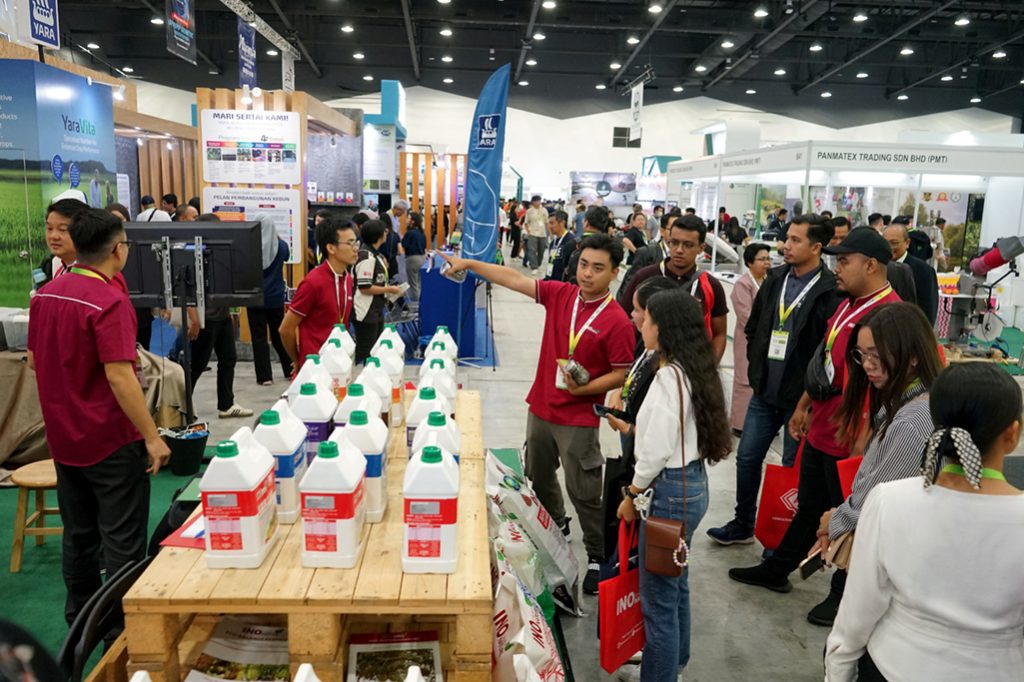
It serves as a rallying point for entrepreneurs, policymakers, technologists, researchers and farmers — all united in shaping the future of food systems
by AKMAR ANNUAR
THE AgTech International Agro Expo 2025, brought together more than just exhibitors — it offered a panoramic view of Malaysia’s evolving agricultural landscape.
This year’s edition was the largest to date, featuring co-located events such as the World Durian Summit, Global Aquaculture Summit and SEEDS Symposium, all under one roof.
Organised by AG Exhibition Sdn Bhd and supported by the Malaysia Convention and Exhibition Bureau, the three-day event drew participants and delegations from over 44 countries, including Australia, Spain, Indonesia, the Philippines and Taiwan.
It served as a rallying point for entrepreneurs, policymakers, technologists, researchers and farmers — each invested in shaping the future of food systems.
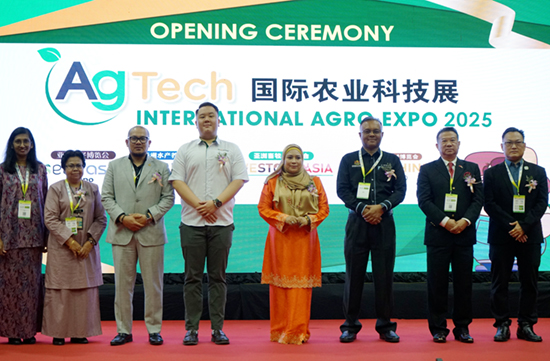
Kok (fourth from left), Tengku Adena, Isham, Malaysia Aquaculture Development Association (MADA) advisor Datuk Seri Dr Ir Andy Seo and Leong at the AgTech International Agro Expo 2025 launch ceremony
Platform for Transformation
AG exhibition director Kok Jian Shen welcomed key government, academic and industry figures, including Malaysia Economic and Entrepreneur Development Council (MEEDC), Agriculture and Food Security Ministry (MAFS), Halal International Selangor and the National Seed Association of Malaysia (NSAM).
The expo has grown each year in booth numbers and pre-registered visitors, with 2025 marking its largest turnout yet.
“Our mission has always been to ensure that industry stakeholders — from smallscale farmers to global agritech leaders — stay informed and empowered. We aim to drive productivity, sustainability and innovation across the sector,” he said in his opening address.
MEEDC president Tengku Adena Tengku Abdullah called for continued support of entrepreneurs and startups in agriculture, describing the expo as “a catalyst for change.”
“I strongly believe this expo is a testament to the power of collaborations, bringing together government agencies, businesses, organisations and agriculture leaders — the very heart of our ecosystem — to explore the transformative power of new technologies.”
She reaffirmed that MEEDC is working to facilitate funding, partnerships and innovation networks that can support growth in agri-based industries.
She also highlighted the potential of digitalisation, drones, sensors and climate-resilient crops to boost food security and agricultural profitability.
Meanwhile, MAFS secretary general Datuk Seri Isham Ishak said Malaysia’s agriculture sector must embrace new models to remain competitive and resilient.
“The expo is a remarkable example of how we can bridge agriculture, aquaculture and livestock to strengthen the agri-food ecosystem.”
He commended NSAM and other associations for co-organising the co-located summits, which demonstrates the importance of partnerships in building sectoral resilience.
NSAM president and Universiti Putra Malaysia (UPM) lecturer Prof Uma Rani Sinniah said the expo’s focus on Seed Asia, Aqua Asia and Livestock Asia reflects critical pillars of food security.
“Our goal is to bridge gaps and enhance the seed industry, knowing that seeds are the basic input for agriculture.”
She expressed her gratitude to AG Tech for its significant support in advancing the association’s collaboration with the Asia and Pacific Seed Association. She further recognised the organisation’s generous sponsorship, which facilitated the participation of more than 200 students in the programme.
“Students embody the future leadership of the agricultural sector.
“Early engagement is essential to cultivating their potential and securing the longterm sustainability and advancement of the industry.”
Also present was Malaysia International Durian Industry Development Association (MIDIDA) executive chairman Leong Chee Hoe who spoke on the rise of the Musang King and Malaysia’s efforts to standardise quality, increase sustainability and expand into international markets.
“Our mission is to connect growers, processors, exporters and researchers and to build a resilient, innovative and future-ready durian industry,” he said.
The exhibition hall spanned multiple zones covering agri-tech machinery, digital platforms, chemical inputs, seed innovation and aquaculture systems.
The venue also included a dedicated showcase on food traceability systems, drone-integrated farming solutions and artificial intelligence (AI)-assisted precision agriculture.
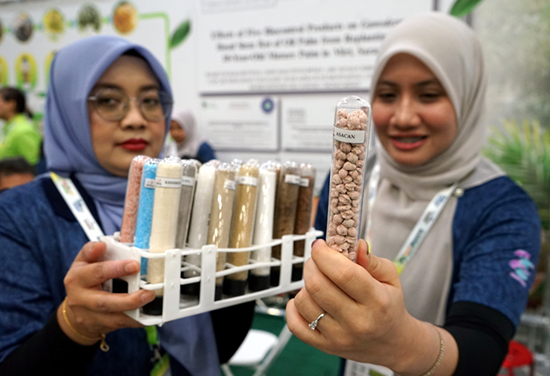
One of this year’s key themes is data-driven agriculture, focusing on timely fertiliser application and strategic chemical use
SEEDS Symposium Expands Dialogue on Innovation
Running alongside the exhibition, SEEDS Symposium — which stands for sustainability, emerging technologies, entrepreneurship, digitalisation and scalability — brought together researchers, academics and policy experts to explore solutions for food system transformation.
The symposium highlighted national seed security, where MAFS’ Food Security Division deputy secretary Mohd Khairuzaki Paiman stressed that quality seeds form the foundation of productivity across crops, livestock and aquaculture.
“If we want to talk about long-term agricultural resilience that spans generations, we must begin with quality seeds,” he said.
Mohd Khairuzaki outlined how Malaysia still depends on imported seeds for 90% of its needs, worth RM80 million in 2023. He warned that disruptions to this supply chain could undermine food sovereignty.
To address this, he called for greater investment in local seed development, better outreach to farmers and improved alignment between research and real-world conditions.
The theme of climate resilience continued with a presentation by Malaysian Agricultural Research and Development Institute (MARDI) Agrobiodiversity and Environment Research Centre Climate Change Programme deputy director Mohd Fairuz Md Suptian, who warned that average annual temperatures in Malaysia could increase by 3.1°C by 2100, while rainfall becomes more erratic. “We must develop seed varieties that can survive in extreme and unpredictable conditions,” he said.
Department of Agriculture deputy DG Mat Iesak Ngathinee’s presentation highlighted the risks of low-quality seeds — including lower yields, increased pest control costs and food security vulnerabilities.
He proposed digitised seed certification, better legal protections and stronger public-private research and development (R&D) collaboration.
Meanwhile, Universiti Putra Malaysia (UPM) Faculty of Agriculture Plant Molecular Biology Prof Dr Siti Nor Akmar Abdullah spoke on genome editing and the need for ethical and inclusive communication.
“The science is already here, but policy, ethics and perception must follow,” she said.
UKM Institute of Systems Biolog y Prof Emeritus Dr Normah Mohd Noor then shared case studies from vertical farms in Kuala Lumpur and Penang, emphasising urban agriculture’s potential in land-scarce cities.
“Urban farming is no longer a fringe activity. It’s a practical solution in a land-scarce future,” she noted.
Meanwhile, MARDI’s Dr Nur Azura Adam highlighted the importance of youth development and advocated for the integration of sustainability into agricultural education.
“Our job is to change the narrative. This means showcasing innovation and career opportunities that go beyond just planting and har vesting,” she said.
There was also a session on Research and Innovation in Seed Development, moderated by MARDI.
Presenters included Green World Genetics (virus-resistant cucumber seeds), Arus Prima Jaya (in vitro propagation), SICPA (blockchain seed traceability) and APAC (grain moisture testing).
Originally established in the Netherlands, seed enhancement company International Seed Technolog y Co (INCOTEC) closed with seed coating innovations designed to support germination and resilience.
“We are building resilience right from the seed,” said an INCOTEC spokesperson.
In the Asia and Pacific Seed Association (APSA) Seed Technolog y Webinar, Prof Helena Freitas from the University of Coimbra explained how seed innovation supports regenerative farming.
“Seed resilience is central to biodiversity restoration,” she said.
Barry Hoff and Carola Peters of INCOTEC highlighted microbial-based coatings aligned with organic certification.
During the Seed Industry Development in Malaysia session, UPM presented climate-adapted rice and vegetables, Enza Zaden Asia demonstrated AI-supported breeding and MARDI unveiled its National Seed Hub to centralise testing, certification and commercialisation.
A session by the Department of Agriculture titled Achievements in the Seed Industry in Malaysia highlighted best practices in paddy, corn and soybean production, phytosanitary controls and pest surveillance.
MAFS outlined investment incentives and export plans targetting Indonesia and Bangladesh, while reaffirming Malaysia’s alignment with global frameworks like International Union for the Protection of New Varieties of Plants (UPOV).
Malaysian Research Accelerator for Technology and Innovation (MRANTI) introduced digital platforms for seed testing using realtime sensor and satellite technologies.
Isham called for Malaysia to position itself as a regional seed innovation hub through better integration between universities, industries and government.
“We must build a globally respected seed ecosystem — one that begins with national policy and ends in international markets,” he said.
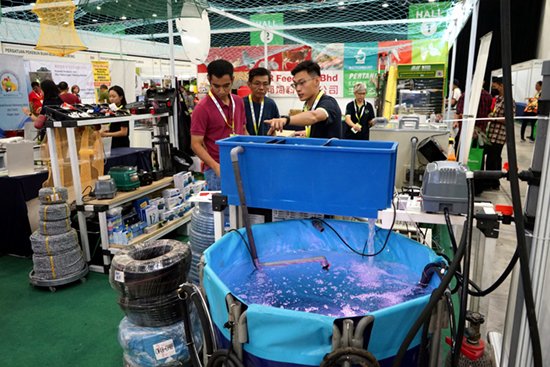
CPR Feed offers a full range of solutions, from water quality monitoring systems to expert consultancy services
Digital Transformation, AI in Farming
Several key panels delved into forward-looking topics, including the digitalisation of agriculture.
In a session titled “Empowering the Agriculture Sector with Digital AgTech Adoption”, speaker Navin Sinnathamby made the case for robust adoption of smart farming tools, from Internet of Things (IoT) soil sensors to satellite image analysis for yield prediction.
He said technolog y adoption must be farmer-friendly and scalable.
“We don’t need technolog y that’s sophisticated but unusable. We need tools that farmers can understand, afford and adapt to.”
Another notable panel was led by Janice Toh, who explored labour shortages in Malaysia’s palm oil plantations.
Her talk, “Is There a Low-Cost Solution to Ease Labour Shortage in Malaysia Palm Oil Plantation?” addressed the urgent need for mechanisation in harvesting and fertiliser application — particularly in smaller estates with limited budgets.
“Labour is no longer just a cost issue — it’s a structural bottleneck. Without mechanisation, we risk declining yields,” she said.
Carbon farming and the regenerative economy speakers Matt Liew and Jean Tan led an eye-opening session titled “From Farming to Carbon Farming: Empowering Farmers in the New Regenerative Economy”.
The panel laid out how Malaysian farmers could be paid not just for crops but also for the carbon they sequester through sustainable practices.
The duo advocated for financial incentives to drive regenerative agriculture, including cover cropping, rotational grazing and compost application.
Liew said the carbon market is real a nd that farmers can participate and be compensated.
Tan emphasised the importance of certification and measurement.
“Without a way to measure impact, it’s hard to convince regulators or buyers,” she noted.
The session concluded with a call for policy alignment and pilot projects in highland and peat soil regions.
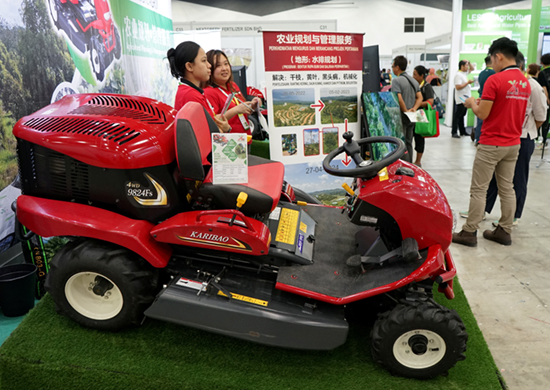
Alamgro Agro showcases the 4WD 9824Fs Atex ride-on mower at the event
AI, Aquaculture: Feeding the Future
In another standout session, Rafiq Hakim delivered a talk titled “Empowering the Farmers, Feeding the Future: Leveraging AI and Machine Learning to Transform Aquaculture”.
He described how predictive analytics, under water cameras and real-time feeding systems are beginning to change fish and shrimp farming practices in South-East Asia.
“By using AI, we can optimise feeding schedules to avoid waste and monitor fish health in ways that were never possible before.”
Rafiq also shared pilot results showing a 17% improvement in feed conversion ratios and a reduction in mortality rates.
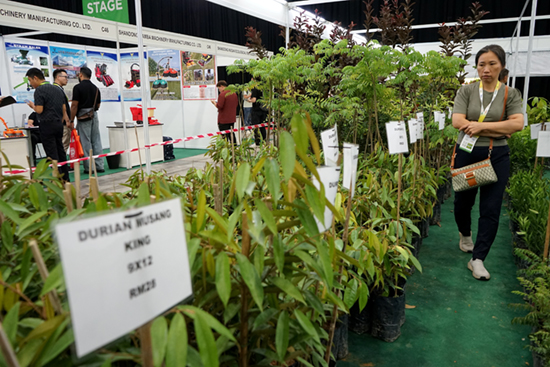
Various durian trees at the opening ceremony of Ag Tech International Agro Expo 2025 at Setia Alam
Driving Sector-wide Transformation
The event’s momentum stemmed from Kok’s vision, who also founded Agroworld Media Sdn Bhd and spent over three decades in agricultural media before launching the AgTech platform.
“I started this all on my own. I used to do agriculture media, which I’m still doing — running it for 33 years — and I really pushed for this because I knew there was a need for this platform,” he told The Malaysian Reserve (TMR).
Kok noted that what began with just 80 booths has now grown to over 300, with participation ranging from equipment manufacturers to climate-smart solution providers.
He explained that the seminars and networking spaces were designed to help both traditional and tech-savvy farmers bridge knowledge gaps and access updates on new government grants and innovations.
The platform’s core mission, is to keep farmers informed of the latest products, technologies and methods — especially as climate change increases the urgency of sustainable, data-backed practices.
The exhibition showcased a wide spectrum of solutions, from heavy machinery and agrochemicals to drones and smart monitoring devices — all aimed at helping farmers tackle challenges like labour shortages and erratic weather patterns.
Kok said because of climate changes, people need a solution.
“Every year, our objective is to make sure everybody is up to date with agriculture knowledge,” he said.
One of this year’s key themes is data-driven agriculture, focusing on timely fertiliser application and strategic chemical use.
“We don’t just throw fertiliser randomly. We look at the data — when’s the right time, what’s the season?” Kok added.
To bridge generational knowledge gaps, AgTech introduced over 90 seminars throughout the expo to keep older farmers informed on new grants and technological developments.
Kok added that small businesses like Farm Mate Manufacturing (M) Sdn Bhd have grown alongside the platform, underscoring its long-term impact.
Among the long-time participants is CPR Feed Sdn Bhd, based in Rawang, Selangor, and helmed by co-founders Koo Lee Lee and his wife.
What started as a modest fish feed business has grown into a diversified operation offering over 5,000 agriculture and aquaculture products.
Known for its extensive inventory and hands-on approach — including handmade fishnets crafted by Koo himself — CPR Feed has evolved by responding directly to customer needs.
The company started by only selling animal feed like fish pellets. But over time, its customers kept asking for more equipment, allowing CPR Feed to expand.
Today, the company supplies everything from water quality monitors to advanced consultation services.
One standout innovation is a portable device that tracks water pH and oxygen levels, triggering alerts when critical thresholds are breached. It helps the farmer take action before the fish die or the crop fails.
CPR Feed also offers free consultations to farmers seeking guidance such as navigating changing weather and soil conditions.
Another exhibitor, Alamgro Agro Sdn Bhd, is headquartered in Muar, Johor, has made a name for itself in durian orchard care and sustainable agrochemical solutions.
MD Tee Ming Pang said the company provides full-service orchard management, including precision mowing services using machinery imported from Japan — equipment tailored to local soil conditions for minimal compaction and maximum hygiene.
“Our goal is to make the trees healthy and beautiful. If the tree is healthy, everything from the leaves to the fruit will be high quality,” Tee told TMR.
Alamgro Agro is a regular participant at the AgTech Expo, viewing it as a valuable platform for connecting with farmers and promoting its integrated fertiliser and pest control solutions.
Meanwhile, Advansia Sdn Bhd — established in 2005 and based in Shah Alam, Selangor — returned for its second year at the expo.
Product manager Steve Ng Kok Leang told TMR that Advansia specialises in eco -friendly agrochemical and bio-solutions for crops like paddy, fruits, vegetables, ornamentals and oil palm.
Ng said the company’s latest innovation is a biocontrol product called Lakota, introduced during one of the expo’s technical seminars.
Operating under the NCL Group, Advansia also owns NCL Seed Biotech, which offers seedlings, water-soluble fertilisers and slowrelease bio-nutrients.
The expo, Ng said, provides an opportunity not just to market their offerings, but to engage directly with farmers and gather feedback for future R&D.
“For us, this expo is about more than marketing. It’s about dialogue and collaboration. We’re using this platform to share our R&D work and promote sustainable agriculture,” he told TMR.
Future Directions
In his closing remarks, Kok announced that AgTech will expand to Sabah in October before returning in 2026 with more international tie-ups and deeper engagement with farming communities.
“This expo is not just about showcasing technologies. It’s about charting the future of agriculture in Malaysia and beyond,” he said.
The 2025 edition proved to be more than just a trade show — it was a catalyst for dialogue, partnerships and strategic planning.
With government support, regional collaboration and strong exhibitor turnout, the event reaffirmed its role as a linchpin in Malaysia’s agri-food transformation.
- This article first appeared in The Malaysian Reserve weekly print edition
RELATED ARTICLES
The post AgTech 2025 pushes for tech adoption, seed sovereignty in Malaysian farming appeared first on The Malaysian Reserve.
